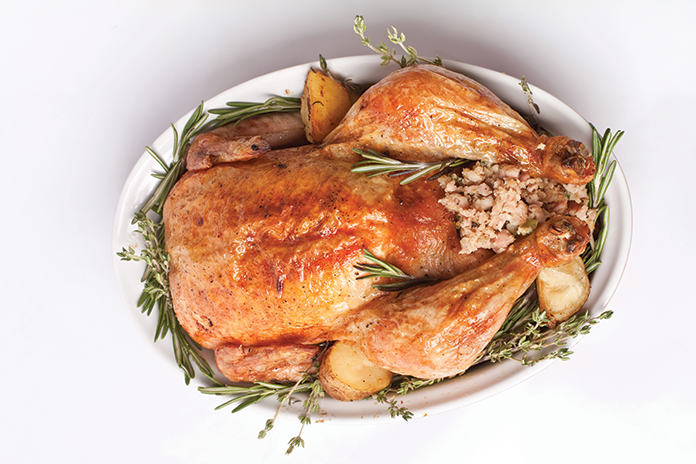We asked Ryan Fibiger of Saugatuck Craft Butchery for tips on sourcing and cooking a fresh turkey from a farm like Old Macdonald’s, instead of a frozen bird from a gigantic industrial farm.
How to Start
Look for a pasture-raised fresh turkey, recommends Fibiger. Because pasture-raising animals is time consuming and difficult, Fibiger says that a farm that is pasture-raising its birds is probably doing the other things he wants a farm to do. “Knowing something is pasture-raised already checks most of the boxes for me.”
At its simplest, a pasture-raised animal is living the life farm animals used to live – they eat grasses and other things their bodies are designed to eat and they move about and develop muscles. For the consumer, this means that the resulting meat has more flavor, less of a negative environmental impact, and is generally free from antibiotics, hormones and additives commonly found in products from an industrial farm. (Fun fact: It was widely reported last year that industrial farmers are feeding their cows candy to fatten them quickly and inexpensively. You won’t find pasture-raised turkeys feasting on gummy worms and candy corn.)
Good to Know
Pasture-raised birds will cook quicker than a typical store-bought bird. “Really watch them,” says Fibiger, who adds that they might cook up to an hour faster than store-bought turkeys of the same size.
The color of a pasture-raised turkey will also be slightly different — the yellow color of a typical frozen turkey comes from the corn in their feed, so a pasture-raised animal will have more of a white tone to the flesh, with more dark meat in the bird.
The Fixins
Your typical grocery store turkey comes with giblets in a bag in the cavity. While these make wonderful ingredients for gravy, Fibiger cautions that innards should be as fresh as possible. “Usually with a frozen bird, I don’t encourage people to use the giblets. If you need any additional fresh organs, we usually have extra that we will sell.”
Size Matters
When it comes to pasture-raised turkeys, you’ll have no problem finding 10 to 12 pounders on up to about 20 or 25 pounds. What you won’t find are enormous turkeys, which Fibiger says is a good thing. “I would always recommend two small or medium birds over one monster bird.”
And frozen birds are commonly injected with water and saline (this is often noted on the packaging as being “enhanced”), which bulks up the animal — and adds sodium to your plate. So a fresh, farm-raised turkey of 18 pounds has more meat on it than an 18-pounder from an industrial farm. Fibiger also cautions that because of the additional water content in a frozen turkey, as you roast a bird, you are also steaming it to a degree and the resulting flavor will be different than if you roast a turkey that has not been “enhanced.”
Where to Buy
Fibiger suggests these farms in the area to source both heritage breeds and broad-breasted white turkeys:
• Ekonk Hill Turkey Farm in Moosup, CT
• Gozzi’s Turkey Farms in Guilford, CT
Ryan Fibiger is owner and head butcher of Saugatuck Craft Butchery in Westport, CT, which he founded after discovering how difficult it can be to source locally, humanely and sustainably produced meats. craftbutchery.com




